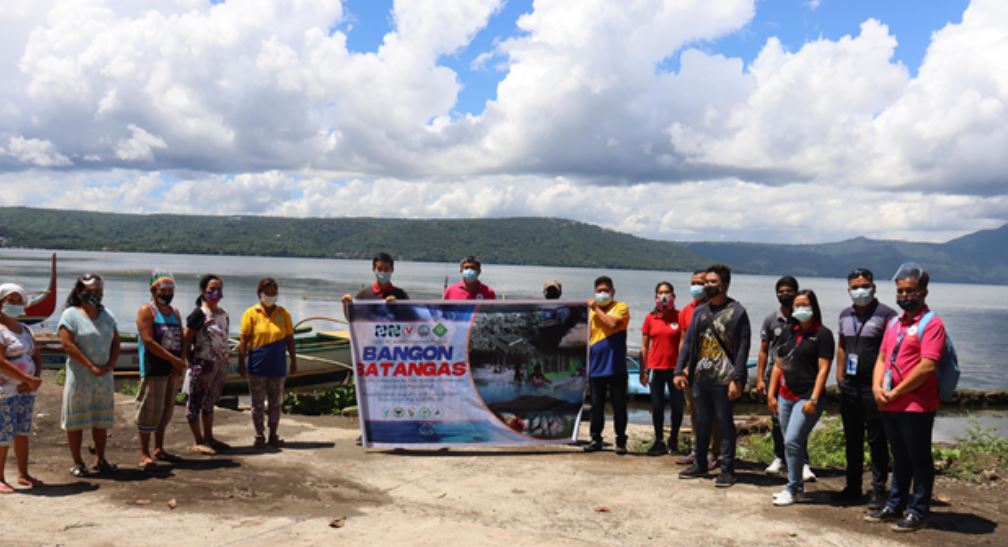 |
| Batangas State University (BatStateU)'s Bangon Batangas Team (Image Source: Good News Pilipinas) |
Batangas State University (BatStateU), one of the premiere state colleges and universities in the province of Batangas, is leading the use of science and technology in its community rehabilitation efforts to help individuals and families across various towns within the province that were affected by the Taal Volcano eruption. The university led a science-based initiative to help the families living in the surrounding localities of the volcano return to productivity in spite of renewed unrest and activity.
BSU recently launched the Bangon Batangas project science and technology based intervention to Taal Volcano's Internally Displaced Population (IDP) through funding from the Philippine Council for Agriculture, Aquatic and Natural Resources Research and Development of the Department of Science and Technology (DOST-PCAARRD). The project that aims to assess the damages brought about by the Taal Volcano eruption in January 2020 intends to create positive intervention and effective rehabilitation plans focusing on the 151,386 families or 584,236 individuals across the provinces of Batangas, Cavite, Laguna and Quezon. About 1,813 families comprising of 6,666 individuals were evacuated to temporary shelters during the 2020 eruption.
The project implementer will assess the damages to their livelihood and the appropriate interventions in the municipalities of Talisay, Laurel, Agoncillo, San Nicolas and Balete in the province of Batangas which were badly hit by the eruption and provide relief operations to affected families. Recently last July 7, Taal Volcano had a "short-lived" phreatomagmatic eruption that occurred on its main crater. The short eruption that lasted for a few minutes prompted the Department of Science and Technology - Philippine Institute of Volcanology and Seismology (DOST-PHIVOLCS) to raise the warning to Alert Level 3 where there is a high level of volcanic unrest, sustained increase in the levels of volcanic earthquakes which may be perceptible, occurance of low-frequency earthquakes, volcanic tremors and rumbling sounds. Moreover, the said Alert Level is characterized by forceful and voluminous steam/ash eruptions, sustained increase in carbon dioxide emission rates, and ground deformation or swelling of the edifice which may involve dome growth and/or lava flow and resultant rockfall.
The Bangon Batangas project is primarily tasked to conduct assessments and surveys of at least 39% (2,600 families) of the displaced population who are mostly sustenance farmers relying on crops and livestock farming, fisherfolks, aquaculture farmers and ecotour guides. It will be implemented in collaboration with Cavite State University (CSU) which will conduct a study on the eruption's damage to high-value crops and Laguna State Polytechnic College (LSPC) assessing the damage on aquaculture and fisheries. According to BatStateU Lobo Campus' Dr. Romel U. Briones who leads the project, the initial study suggested that the affected residents temporarily staying in evacuation centers still want to pursue their livelihood prior to the eruption by planting vegetables and other high-value crops.
In a recent pronouncement, DOST Undersecretary and DOST-PHIVOLCS OIC (Officer In Charge) Dr. Renato U. Solidum Jr. expressed the need for a long-term development plan for surrounding locals as the active volcano showed renewed activity. He added that in the group's initial studies conducted, the local government would need sustainable aquaculture and fisheries livelihood intervention, provide an application of science-based soil amelioration to treat farmlands that are heavily affected by the ashfall and ensure accessibility to the market and other trading posts. Aside from these, he also underscored the need for rehabilitation and recovery programs based on the buildup of existing skills and resources which will ensure immediate social acceptance and sustainability, building back more resilient livelihood and capacitating of residents to new skills.